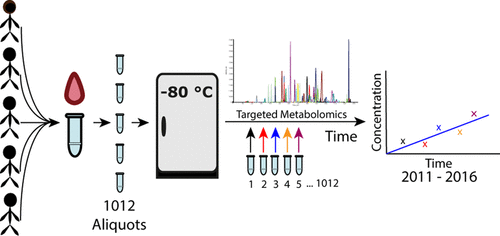当前位置:
X-MOL 学术
›
J. Proteome Res.
›
论文详情
Our official English website, www.x-mol.net, welcomes your
feedback! (Note: you will need to create a separate account there.)
Long-Term Stability of Human Plasma Metabolites during Storage at −80 °C
Journal of Proteome Research ( IF 3.8 ) Pub Date : 2017-11-28 00:00:00 , DOI: 10.1021/acs.jproteome.7b00518 Mark Haid , Caroline Muschet , Simone Wahl , Werner Römisch-Margl , Cornelia Prehn , Gabriele Möller , Jerzy Adamski 1, 2
Journal of Proteome Research ( IF 3.8 ) Pub Date : 2017-11-28 00:00:00 , DOI: 10.1021/acs.jproteome.7b00518 Mark Haid , Caroline Muschet , Simone Wahl , Werner Römisch-Margl , Cornelia Prehn , Gabriele Möller , Jerzy Adamski 1, 2
Affiliation

|
Prolonged storage of biospecimen can lead to artificially altered metabolite concentrations and thus bias data analysis in metabolomics experiments. To elucidate the potential impact of long-term storage on the metabolite profile, a pooled human plasma sample was aliquoted and stored at −80 °C. During a time period of five years, 1012 of the aliquots were measured with the Biocrates AbsoluteIDQ p180 targeted-metabolomics assay at 193 time points. Modeling the concentration courses over time revealed that 55 out of 111 metabolites remained stable. The statistically significantly changed metabolites showed on average an increase or decrease of +13.7% or −14.5%, respectively. In detail, increased concentration levels were observed for amino acids (mean: + 15.4%), the sum of hexoses (+7.9%), butyrylcarnitine (+9.4%), and some phospholipids mostly with chain lengths exceeding 40 carbon atoms (mean: +18.0%). Lipids tended to exhibit decreased concentration levels with the following mean concentration changes: acylcarnitines, −12.1%; lysophosphatidylcholines, −15.1%; diacyl-phosphatidylcholines, −17.0%; acyl-alkyl-phosphatidylcholines, −13.3%; sphingomyelins, −14.8%. We conclude that storage of plasma samples at −80 °C for up to five years can lead to altered concentration levels of amino acids, acylcarnitines, glycerophospholipids, sphingomyelins, and the sum of hexoses. These alterations must be considered when analyzing metabolomics data from long-term epidemiological studies.
中文翻译:

人类血浆代谢产物在−80°C储存期间的长期稳定性
长期保存生物样本会导致人为改变代谢物浓度,从而在代谢组学实验中偏向于数据分析。为了阐明长期保存对代谢产物谱的潜在影响,将合并的人血浆样品等分并保存在-80°C。在五年的时间内,使用Biocrates Absolute IDQ测量了1012个等分试样在193个时间点进行p180靶向代谢组学分析。对浓度随时间变化的过程进行建模显示,111种代谢物中的55种保持稳定。统计学上显着变化的代谢物平均分别显示出+ 13.7%或-14.5%的增加或减少。详细地,观察到氨基酸(平均值:+ 15.4%),己糖(+ 7.9%),丁酰肉碱(+ 9.4%)和一些磷脂(链长均超过40个碳原子)的浓度水平升高(平均值: + 18.0%)。脂质的浓度水平倾向于降低,平均浓度变化如下:酰基肉碱,-12.1%;溶血磷脂酰胆碱,-15.1%;二酰基磷脂酰胆碱,-17.0%;酰基-烷基-磷脂酰胆碱,-13.3%;鞘磷脂,-14.8%。我们得出的结论是,血浆样品在-80°C下存储长达五年可能会导致氨基酸,酰基肉碱,甘油磷脂,鞘磷脂和己糖总和的浓度水平发生变化。在分析来自长期流行病学研究的代谢组学数据时,必须考虑这些变化。
更新日期:2017-11-29
中文翻译:

人类血浆代谢产物在−80°C储存期间的长期稳定性
长期保存生物样本会导致人为改变代谢物浓度,从而在代谢组学实验中偏向于数据分析。为了阐明长期保存对代谢产物谱的潜在影响,将合并的人血浆样品等分并保存在-80°C。在五年的时间内,使用Biocrates Absolute IDQ测量了1012个等分试样在193个时间点进行p180靶向代谢组学分析。对浓度随时间变化的过程进行建模显示,111种代谢物中的55种保持稳定。统计学上显着变化的代谢物平均分别显示出+ 13.7%或-14.5%的增加或减少。详细地,观察到氨基酸(平均值:+ 15.4%),己糖(+ 7.9%),丁酰肉碱(+ 9.4%)和一些磷脂(链长均超过40个碳原子)的浓度水平升高(平均值: + 18.0%)。脂质的浓度水平倾向于降低,平均浓度变化如下:酰基肉碱,-12.1%;溶血磷脂酰胆碱,-15.1%;二酰基磷脂酰胆碱,-17.0%;酰基-烷基-磷脂酰胆碱,-13.3%;鞘磷脂,-14.8%。我们得出的结论是,血浆样品在-80°C下存储长达五年可能会导致氨基酸,酰基肉碱,甘油磷脂,鞘磷脂和己糖总和的浓度水平发生变化。在分析来自长期流行病学研究的代谢组学数据时,必须考虑这些变化。











































 京公网安备 11010802027423号
京公网安备 11010802027423号